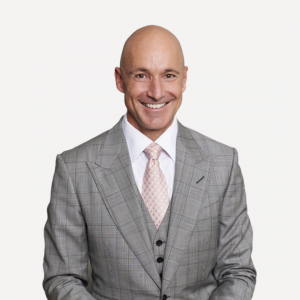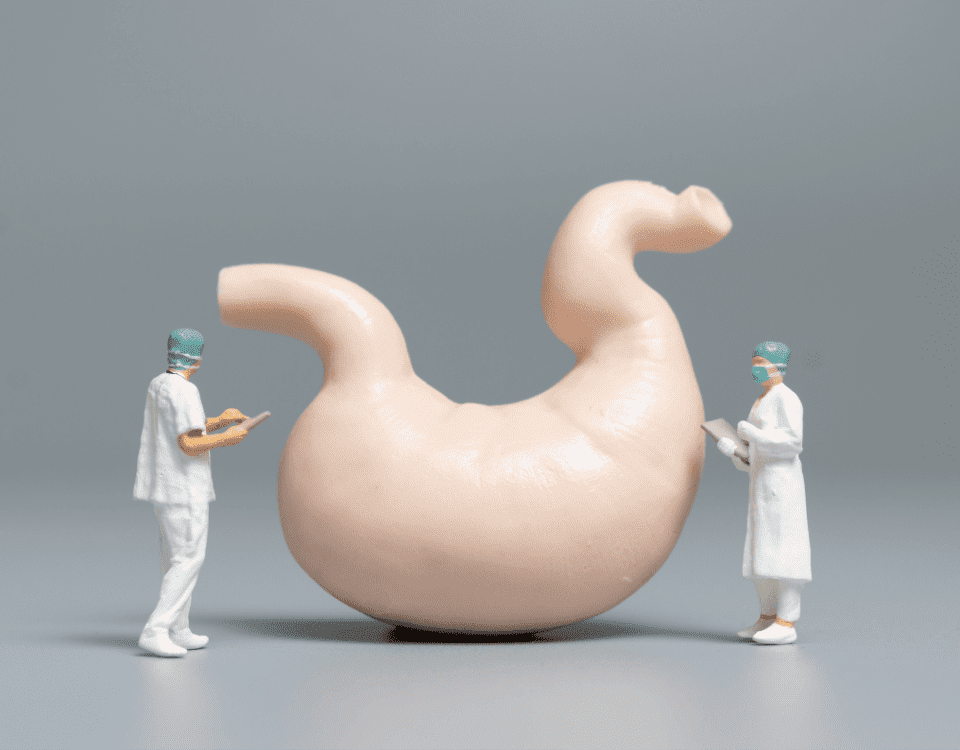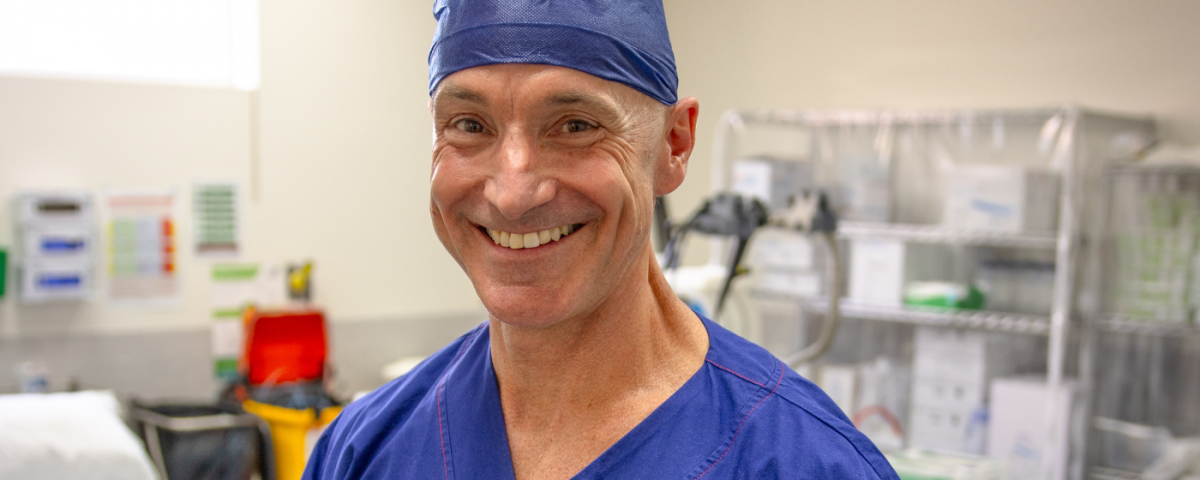
Laparoscopic and Bariatric Surgeon Dr. Jason Winnett has stitched up thousands of patients during countless surgeries – but who would have guessed that it was a love of sewing and fashion that led him into the world of medicine? Here is a Q&A with one of Melbourne’s most sartorially splendid bariatric surgeons.
Q: Why is suturing technique so important in bariatric and other surgeries?
“In the realm of surgery, suturing isn’t just about closing a wound. It embodies the very principle of ‘do no harm’ and requires a lot of delicacy and accuracy. Poor suturing increases the risk of post-operative infection, scarring, and reopening of the wound.
Just as a tailor meticulously sews a garment, surgery brings together the edges of an incision, uniting them with precision and care to staunch bleeding and ensure optimal healing. The art of stitching in surgery is very much a blend of science and artistry.”
Q: So how did your love of sewing drive you into surgery?
“I learnt to sew in my university years. As a public school kid growing up in the Dandenongs, there wasn’t a lot of money to go around.
School was pretty rough (my high school burnt down at one stage!), and I learned Taekwondo to defend myself.
I was one of the first kids in my school to go to university and study medicine. At first, I didn’t get the marks for direct admission into medicine, so I did science for two years and transferred after foregoing my place in dentistry.
When I started my medical degree, I would see many of the other students in wonderfully stylish clothes. I wanted to fit in, so I made clothes for myself and some close friends.
My mum was a fantastic dressmaker and was always sewing my sister’s dance costumes. I had access to an excellent sewing machine and overlocker and would see designer clothes in shop windows and replicate them with my own special twist. Upon completion, I would hand embroider my initials as a proud label (JDW).”
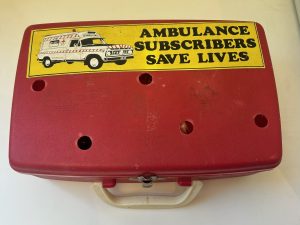
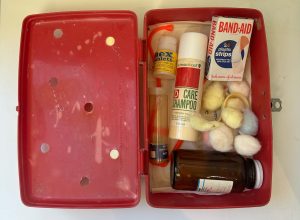
Dr Jason David Winnett’s “First Aid” bag made from a modified lunch box and filled with old medicine bottles, a plastic stethoscope and band aids, and created at the age of 9.
Q: What were some of your most memorable outfits?
“I remember being quite proud of my university outfits, which included a one-piece ski suit made out of parachute material. Another time, I cut up a stack of old jeans and stitched them together to make a jacket with a Mickey Mouse patch on the back.
My friends love to reminisce about how I wore a self-stitched pirate shirt with fluffy sleeves, Cossack pants, and a sparkly vest to a university ball!
Even today, I’m obsessed with what I wear. I have a penchant for three-piece, well-tailored suits and the most outrageous socks possible. No boring block colours for me. And if I run out of ideas, my patients don’t. I often get given socks by my patients for Christmas!
Fashion is an instant language and something I find easy to talk about with patients, who frequently comment on my outfits. Medical conversations can be confronting, so talking about clothes always helps me connect with patients in a fun and unintimidating way.”

Jason’s self-made high-fashion ski outfit
Q: OK, good stitching helps outcomes when it comes to surgery – but what can weight loss patients do to help themselves?
“There is no easy answer. Surgery is not a magic bullet. It helps reduce the desire to eat a lot, but there still has to be a commitment to changing lifestyle, exercising, and adjusting to a mostly protein and vegetable diet.
Avoiding simple carbs like pasta, rice, cakes, and biscuits and swapping them for carbs from leafy greens, legumes, and beans helps keep insulin stable. Exercising for muscle gain, not just aerobically, is also important as muscle burns more kilojoules than fat.
If you’re just trying to lose 5 to 10 kg, intermittent fasting under doctor supervision is often very helpful. Many studies, in fact, now show that fasting is a good diet strategy overall and improves biomarkers of diseases such as diabetes and obesity. However, if you’ve had bariatric surgery, intermittent fasting is NOT recommended for 12 to 18 months after surgery.”
Q: What does the bariatric surgeon always have in his own fridge?
“The one thing I ALWAYS have in my fridge is eggs. I love a hard-boiled egg in the morning with an espresso followed by a protein bar for morning tea. Lunch might be a chicken and salad sandwich on low-carb bread. Dinner is more protein (fish, steak, or chicken) and veggies. I don’t mind a glass or two of wine a few nights a week, but I don’t overdo it.
I try to avoid having junk food in the house, but if it is there for my three kids, I tell them to keep treats at the back of the fridge or freezer so it’s not the first thing they see. Out of sight is out of mind.”
Q: What is your mantra for eating and exercise?
“One of my greatest mentors would often say, ‘Train hard, fight easy.’ This applies equally to most things in my life, including studying, exercising, and surgery. I exercise most days of the week and usually twice on Saturday and Sunday. I try to alternate between aerobic and weight training.
I try to always think ahead about when I’m exercising, lay out my gym outfit the night before, and plan to get up early before the working day begins. I also try to make up for any days I miss. When it comes to snacks, I also ensure there are plenty of healthy options in the car, in the fridge, and in the desk drawer.
Good snacks include nuts, protein bars, hard-boiled eggs, cottage cheese (high in protein), or high-protein yoghurt and fruit.”
If you’re considering starting your weight loss journey and would like professional support, we invite you to make an appointment to meet Jason in person. Dr. Jason Winnett is committed to taking the time to understand your life context and goals, offering personalised solutions that address your mental, emotional, and physical health.
Mr Jason Winnett
Laparoscopic and Bariatric Surgeon
P (03) 9417 1555 admin@winnettspecialistgroup.com.au
www.winnettspecialistgroup.com.au
Queens Terrace, 382 Victoria Parade, East Melbourne 3002
References:
1_Intermittent fasting: the science of going without – PMC (nih.gov)

